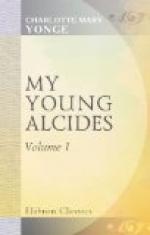As soon as Dermot was able to bear any strain on mind or attention, he gave his keys to Harold. All his long and unhappy accumulation of bills and bonds were routed out from their receptacles at Biston, and brought over by Harold to his office, where he sorted them, and made them intelligible, before harassing his friend with the questions he alone could explain. An hour a day was then spent over them—hours that cost poor Dermot more than he was equal to; but his mind was made up, as he told me, “to face anything rather than go on in the old miserable way.” It was much that he had learnt to think it miserable.
Lady Diana was not much obliged to Harold. She could not think why her patient was so often left out of spirits, and with a headache after those visits, while he was in a feverish state of anxiety about them, that made it worse to put them off than to go through with them; and then, when she had found out the cause, the family pride much disliked letting an outsider into his involvments, and she thought their solicitor would have done the thing much better.
Poor woman, it was hard that, when she thought illness was bringing her son back to her, she found his confidence absorbed by the “bush-ranger,” whom she never liked nor trusted, and his reformation, if reformation it were to prove, not at all conducted on her views of visible repentance and conversion. Dermot was responsive to her awakened tenderness, but he was perversely reticent as to whether repentance or expedience prompted him. She required so much religious demonstration, that she made him shrink from manifesting his real feelings as “humbug,” and Viola knew far more that his repentance was real than she did. Those proofs of true repentance— confession and restitution—I am sure he gave, and that most bravely, when, after weeks of weary and sorrowful work on Harold’s part and his, the whole was sufficiently disentangled to make a lucid statement of his affairs.
He made up his mind to make an arrangement with his creditors, giving up Biston, all his horses—everything, in fact, but Killy Marey, which was entailed on his Tracy cousins. And this second year of George Yolland’s management had made the shares in the Hydriot Company of so much value, that the sale of them would complete the clearance of his obligations. The full schedule of his debts, without reserve, and the estimate of his means of paying them off, was then given by Dermot to his mother, and sent to his uncle, who went over them with his solicitor.
Lady Diana writhed under the notion of selling Biston. It seemed to her to be the means of keeping her son from the place in Ireland, which she disliked more than ever, and she hoped her brother would advance enough to prevent this from being needful; but for this Lord Erymanth was far too wise. He said, as Dermot felt, that Biston had never been anything but an unjustifiable and pernicious luxury and temptation; but he did voluntarily, since it joined his property, propose to purchase it himself, and at such a sum as secured the possibility of a real payment of the debts when the other sales should have been effected.




